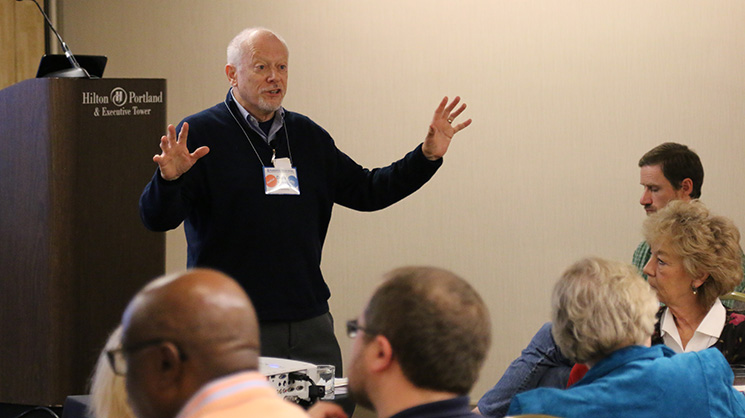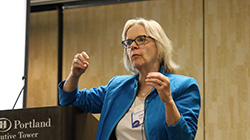“This feels like a pivotal time,” the Reverend Laurie Ferguson told a roomful of presbytery and synod leaders gathered in Portland, Oregon, for the Presbyterian Church (U.S.A.) Polity Conference and five other fall meetings.
Ferguson was referring to a recurring theme in all the meetings: how to respond to the changing landscape of the church. The plenary session she led—for the Association of Mid Council Leaders—was one event in a day chock full of opportunities for inspiration, education, and training.
“From where I sit, you have the most difficult job in the church,” Ferguson told the mid council leaders. “You are some of the smartest, most creative, and faithful leaders I know. You are creating space for the Spirit to work.
“You are dealing with some crucial issues. And you are also dealing with some petty garbage—sometimes in the same day.”
Over the last several days, mid council leaders gathered in Portland—site of the 222nd General Assembly (2016)—have worshipped, learned, and shared ideas about how to respond to the shifting landscape of the denomination.
The October 9–12 gathering includes the Polity Conference, preceded by five other mid council leader events meeting concurrently for the first time: the Moderator’s Conference, the Association of Mid Council Leaders annual meeting, the Association of Stated Clerks annual meeting, New Stated Clerks training, and the General Assembly Committee on Representation training event for synod committees on representation.
Ferguson, who is a licensed clinical psychologist, certified coach, organizational consultant, and ordained Presbyterian minister, invited mid council leaders to share some of the most complex issues they faced. Heads nodded around the room as participants listed such things as:
- How to lead instead of manage
- How to help congregations transform and grow
- Lack of a clear Presbyterian identity
- Polity that sometimes obstructs transformation
- Pressure to deal with the urgent instead of the important
- A constant feeling of falling short
- Minutiae that gets in the way of ministry
Resilience is the key to surviving and thriving amid such challenges, Ferguson said. She defined resilience as “the ability to come back after a crisis or disaster or loss,” adding that resilience “is something you can cultivate or build.”
In a subsequent session, she offered participants tools for cultivating resiliency. These included defining a core purpose and building a strong community.
“We are in the same boat together,” she reminded mid council leaders. “When we connect with each other, we can do better.”
Ferguson also encouraged her listeners to embrace “the role of being storytellers.” People in the church, she said, “are hungry for good stories of hope and purpose and direction.”

David Sawyer speaking to stated clerks.
Storytelling also emerged as a theme in a plenary session of the Association of Stated Clerks, led by the Reverend David R. Sawyer, a consultant with Flourishing Church Consulting and Coaching and a former professor at Louisville Presbyterian Theological Seminary.
“Most stories have lots of themes or strands,” Sawyer said. He guided participants in constructing an “identity narrative” for their organization by identifying common themes from their experiences as stated clerks.
Working in small groups, participants filled the walls with lists of themes on newsprint. These included:
- Helping the wider church understand who we are and what we do
- The need for community and face-to-face connections
- The conviction that polity is a theological enterprise
- The need for professional standards, resources, and training opportunities
- Tension between presbytery stated clerks and executives
In a later session, Sawyer encouraged participants to use these common themes to develop “provocative proposals” for the future. A number of proposals were suggested, including regular regional meetings for stated clerks, uniform resources for stated clerks, a system of mentoring for new stated clerks, and creation of a certification standard for stated clerks and a process for achieving it.
“What you’re doing is research,” Sawyer said. “Narrative data is valid research data.”
Gathering and interpreting the data, he added, enables us to begin asking: “Where is God leading us now? How can we take the best of who we are and leap into the future?”
Follow the Polity Conference and fall meeting events here and on Twitter at presbyga, #policon15.

